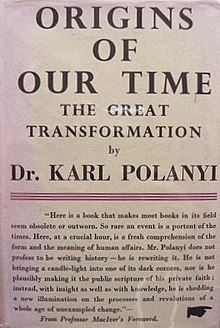
Back Böyük transformasiya Azerbaijani Great Transformation German La gran transformación Spanish دگرگونی بزرگ Persian Suuri murros Finnish La Grande Transformation French La grande trasformazione Italian 大転換 Japanese 거대한 변환 Korean The Great Transformation Latin
 First UK edition (publ. Victor Gollancz, 1945) | |
| Author | Karl Polanyi |
|---|---|
| Country | United States |
| Language | English |
| Subject | |
| Publisher | Farrar & Rinehart |
Publication date | 1944 |
| Followed by | Trade and Markets in the Early Empires (1957) |
| Part of a series on |
| Economic, applied, and development anthropology |
|---|
| Social and cultural anthropology |
The Great Transformation is a book by Karl Polanyi, a Hungarian political economist. First published in 1944 by Farrar & Rinehart, it deals with the social and political upheavals that took place in England during the rise of the market economy. Polanyi contends that the modern market economy and the modern nation-state should be understood not as discrete elements but as a single human invention, which he calls the "Market Society".
A distinguishing characteristic of the "Market Society" is that humanity's economic mentalities have been changed. Prior to this, people based their economies on reciprocity and redistribution across personal and communal relationships.[1] As a consequence of industrialization and increasing state influence, competitive markets were created that undermined these previous social tendencies, replacing them with formal institutions that aimed to promote a self-regulating market economy.[1] The expansion of capitalist institutions with an economically liberal mindset not only changed laws but also fundamentally altered humankind's economic relations; prior to this, markets played a very minor role in human affairs and were not even capable of setting prices because of their diminutive size.[2] It was only after industrialization and the onset of greater state control over newly created market institutions that the myth of human nature's propensity toward rational free trade became widespread.[3] However, Polanyi asserts instead that "man's economy, as a rule, is submerged in his social relationships," [4] and he therefore proposes an alternative ethnographic economic approach called "substantivism", in opposition to "formalism", both terms coined by Polanyi in future work.[5]
On a broader theoretical level, The Great Transformation argues that markets cannot solely be understood through economic theory. Rather, markets are embedded in social and political logics, which makes it necessary for economic analysts to take into account politics when trying to understand the economy.[6][7] For this reason, The Great Transformation is a key work in the fields of political economy and international political economy.
- ^ a b Polanyi, The Great Transformation, ch. 4
- ^ Polanyi, The Great Transformation, ch. 2,3
- ^ Polanyi, The Great Transformation, ch. 3,4 & 15
- ^ Polanyi, The Great Transformation, p. 48
- ^ Polanyi, Karl (1957). "7". In Dalton, George (ed.). Primitive, Archaic and Modern Economies: Essays of Karl Polanyi. Boston, MA: Beacon Press. pp. 139–174.
{{cite book}}:|work=ignored (help) - ^ McNamara, Kathleen R. (2015). The Politics of Everyday Europe: Constructing Authority in the European Union. OUP Oxford. p. 115. ISBN 978-0-19-102552-5.
- ^ Blyth, Mark (2002). Great Transformations: Economic Ideas and Institutional Change in the Twentieth Century. Cambridge University Press. ISBN 978-0-521-01052-8.
© MMXXIII Rich X Search. We shall prevail. All rights reserved. Rich X Search